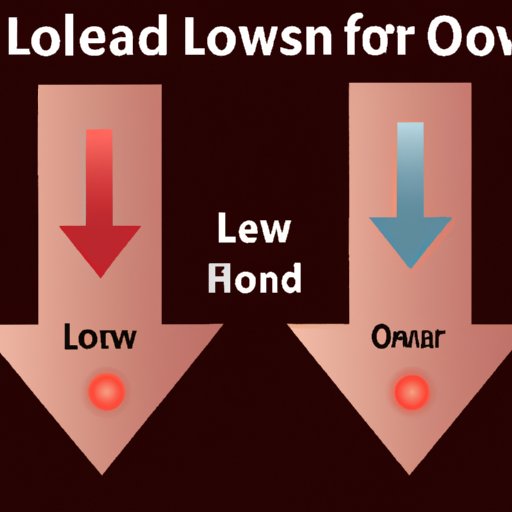
Introduction
Do you feel cold all the time? Do you find it hard to regulate your body temperature? If so, you may be experiencing symptoms of low iron levels. Iron deficiency is a common issue that affects people of all ages and backgrounds, and it can cause a range of symptoms, including feeling cold and tired. In this article, we’ll explore the link between iron deficiency and feeling chilly, and provide tips for how to address the issue.
The Link Between Iron Deficiency and Cold Sensitivity
Iron is a vital component of hemoglobin, a protein in red blood cells that carries oxygen from the lungs to the rest of the body. Without enough iron, the body cannot produce enough hemoglobin, which can lead to anemia. One of the symptoms of anemia is feeling cold and sensitive to temperature changes. When the body is lacking in iron, it cannot regulate its temperature properly, leading to feelings of coldness.
Other symptoms of iron deficiency can include fatigue, weakness, shortness of breath, pale skin, and headaches. If left untreated, iron deficiency anemia can lead to more severe symptoms, such as chest pain, rapid heartbeat, and arrhythmias.
Feeling Chilly and Tired? Could Iron Deficiency be the Cause?
Iron-deficient anemia is one of the most common forms of anemia, and it can cause a range of symptoms that can impact daily life. Fatigue and exhaustion are two of the most common symptoms associated with anemia, and they can also cause feelings of coldness. When the body is low on iron, it cannot produce enough red blood cells, which means that oxygen delivery to the body’s tissues is reduced. This can lead to feelings of tiredness and lethargy.
In some cases, iron deficiency anemia can also cause pale skin, brittle nails, and hair loss.
The Science Behind Why Low Iron Levels Leave You Feeling Cold
Iron plays a crucial role in regulating body temperature, as it helps to produce heat. When the body is cold, it increases its metabolic rate in order to generate more heat. This process requires iron, as it is involved in the production of ATP, the molecule that fuels metabolic processes.
If the body is low on iron, it cannot produce enough ATP, and its ability to generate heat is impaired. This can cause feelings of coldness, even in relatively warm environments.
Several studies have shown that low iron levels are linked to feelings of coldness, and that iron supplementation can help to alleviate this symptom.
How Iron Regulates Temperature and What Happens When You Lack It
The body has several mechanisms for regulating temperature, including shivering, sweating, and vasoconstriction (the narrowing of blood vessels). Iron plays a key role in each of these processes, as it is involved in the production of enzymes that catalyze the chemical reactions required for temperature regulation.
When the body is low on iron, it cannot produce enough of these enzymes, which means that its ability to regulate temperature is impaired. This can cause feelings of coldness, as the body is unable to keep itself warm enough.

Low Iron Levels: A Common Yet Often Overlooked Cause of Feeling Cold
Iron-deficient anemia is a common yet often overlooked cause of feeling cold. Many people assume that feeling chilly is simply a normal part of their body’s response to temperature changes, and they don’t think to get their iron levels checked.
If you’re feeling cold all the time, it’s worth getting your iron levels checked. You can do this by asking your doctor for a blood test. If you have iron-deficient anemia, your doctor may recommend iron supplements or other treatments to address the issue.
Exploring the Relationship between Iron Deficiency Anemia and Feeling Cold
Real-life examples can help to illustrate the impact of iron deficiency anemia on feeling cold. One study looked at 50 women with iron-deficient anemia and found that nearly half of them reported feeling cold all the time, even in warm environments. Another study found that people who were deficient in iron were more likely to report feeling cold than those with normal iron levels.
These studies highlight the importance of maintaining healthy iron levels for overall well-being, and the potential impact that iron deficiency can have on daily life.
From Fatigue to Frostiness: The Impact of Low Iron on Your Body Temperature
Iron deficiency can impact overall health and well-being in many ways, from causing fatigue and exhaustion to making you feel chilly all the time. If you’re experiencing symptoms of iron-deficient anemia, it’s important to get checked by a medical professional.
Iron supplementation can be an effective way to address the issue, but it is important to follow your doctor’s instructions and not take too much iron, as it can be toxic in high doses.
Conclusion
In conclusion, feeling cold all the time can be a sign of low iron levels. Iron plays a crucial role in regulating body temperature, and when the body is lacking in iron, it can lead to feelings of coldness and sensitivity to temperature changes. If you’re experiencing these symptoms, it’s important to get checked by a medical professional and take steps to address the issue. Maintaining healthy iron levels is essential for overall health and well-being.
Call-to-action: If you’re experiencing symptoms of iron-deficient anemia, such as feeling cold all the time, talk to your doctor about getting your iron levels checked. With the right treatment, you can start feeling better and enjoy a better quality of life.




